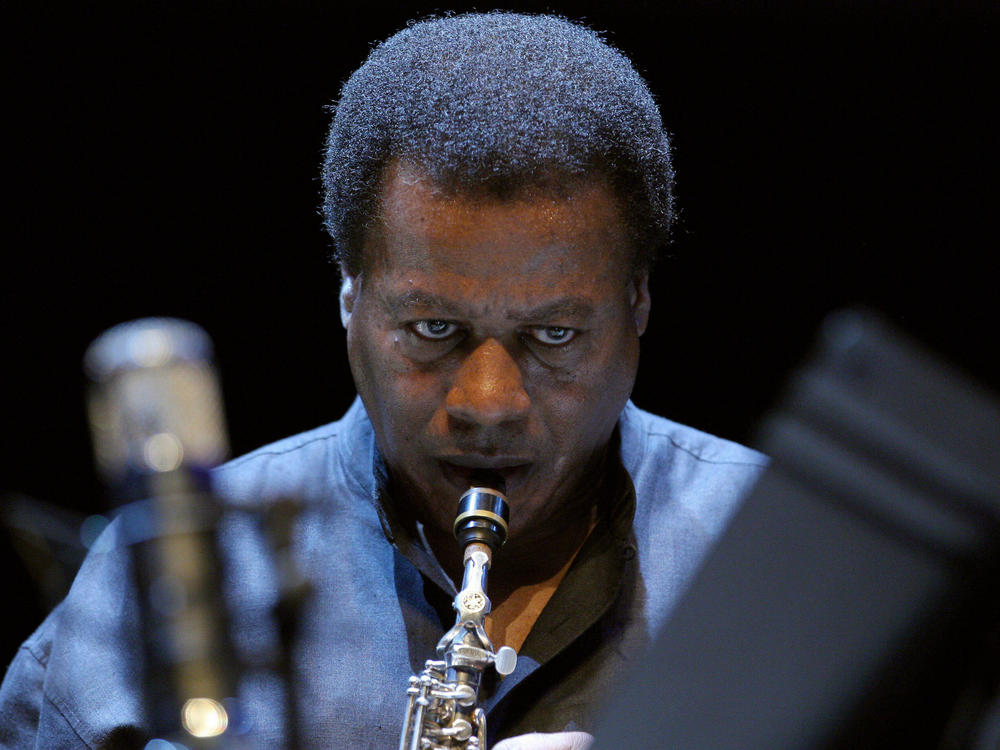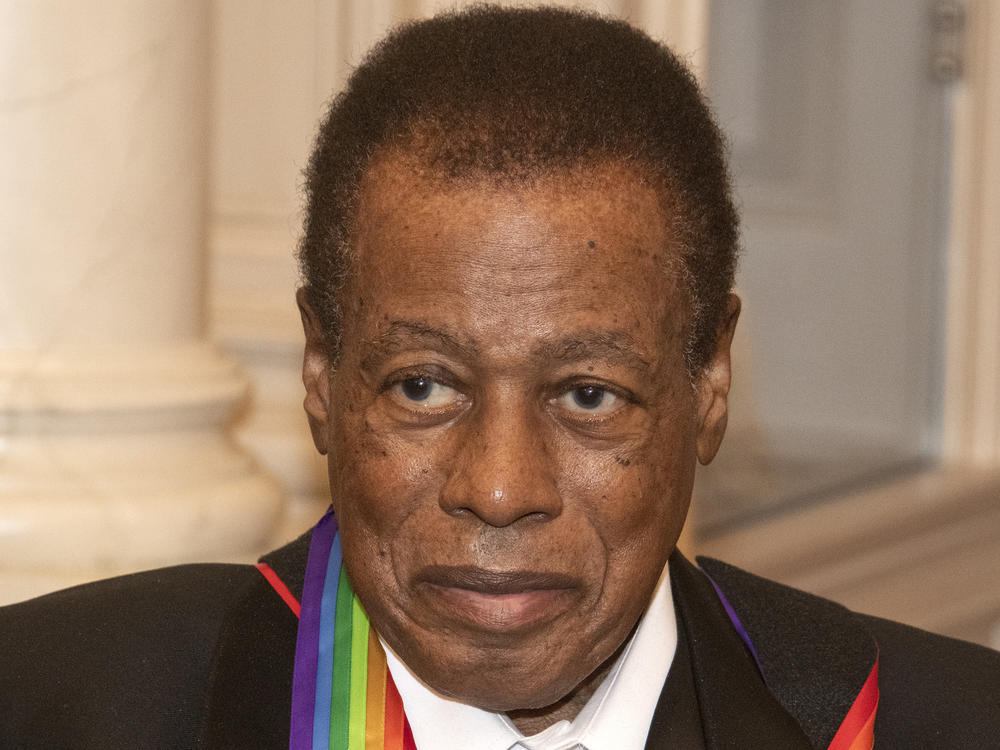Section Branding
Header Content
The lessons of Wayne Shorter, engine of imagination
Primary Content
Composer, saxophonist and devout Buddhist Wayne Shorter died last week at age 89. His visionary composition and improvisation shaped not only 20th-century jazz but also pop, world and classical music. Shorter was as beloved personally for his philosophical character and colorful aphorisms as he was for his musical accomplishments. Michelle Mercer is the author of Footprints, a 2005 biography of Shorter, and shares this personal essay on her experiences "translating" the artist and his life.
In remembrances last week following the passing of legendary composer and jazz musician Wayne Shorter, nearly everyone seemed to have a story of a "Wayne-ism" – epigrammatic, poetic, or allegorical words he'd deliver in order to spur reflection. "I'm not into composition. I'm into decomposition," he once told musician Jason Moran.
In the years I spent with Wayne for Footprints, the biography I wrote with his cooperation, I observed him dispensing these pearls to everyone – bookstore clerks, hotel breakfast chefs, young musicians backstage, fellow Buddhists at home. The meanings of Wayne's isms were heightened for me by years of listening to his music, itself rich in existential questions and radical presence. I eventually grew skilled at translating his koans partly because I was so often asked, "What do you think he meant?" I enjoyed the role. Characterizing such a unique and original artist and crafting the story of his long and varied history in music was a writer's dream.
By the middle of 2004, I'd been researching for Footprints for over two years, talking with scores of people who were part of Wayne's life and career, digging through university and home archives that he and his colleagues opened up to me. Still, the book's deadline loomed, and sooner than I'd hoped. I went on another of what had become a familiar flight, down to Wayne's home outside Miami, to explain the project's urgency to him and his wife, Carolina. Wayne and I sat down; I asked him something about a later Weather Report period.
"Oh, that was 'It's-later-than-you-think' time . . . have you seen that movie with–" and Wayne was off.
But Carolina swept in: "Wayne, Michelle just told us she has to finish the book in a matter of weeks," she said.
"Weeks?" asked Wayne.
"A firm, firm deadline," Carolina said.
He looked at me. "What do you need to know?"
Then came a great surprise: Wayne proceeded to answer every question as clearly and concisely as an encyclopedia entry. I'd known him to speak directly, in non-Wayne-isms, with his wife, his band and me, but didn't know until then that he had the capacity to unspool reference-book paragraphs on command.
Wayne chose to communicate unconventionally and creatively because that style was most uniquely him, truest to his imagination. Most of us grow out of our imaginations, or at least compromise them with age. Wayne never did and, as a Buddhist, he treasured and nurtured a state of wonder in others as well, attempting to activate the imagination in everyone he met.
In early 2005, at the end of some demanding days of book promotion, a transportation mix-up left Wayne late for a joint interview with me. He'd never been late before – his Weather Report co-leader Joe Zawinul once told me that an enduring image of tour life was arriving in the hotel lobby at call time to find Wayne "always already standing there with his little saxophone, neat and ready to go." Touring for decades makes most professional musicians punctual – imagine what tough bandleaders like Art Blakey and Miles Davis said or did to any sideman who made their groups late for a flight.
We went ahead and started the interview without Wayne, but moments before we went on the air, the interviewer leaned over and murmured some cynical asides to me, about Wayne and other jazz musicians' propensity for lateness and irresponsibility. The remarks were stunningly unprofessional, stereotypical and dated. We went live to millions before I could respond.
Wayne arrived and entered the studio at the first break. I shot him a look that warned, "this interviewer can't be trusted. Let's just get through it." He shot back a look that answered "already ascertained – and believe me, I've seen it all before. Stay cool."
We got through the otherwise-standard interview and headed to the elevator with Carolina. When the doors closed, I was surprised to find myself falling apart. For years, I'd been nothing but self-possessed and fully composed in Wayne's presence. Now, tears fell before I could stop them; I slumped into the elevator's corner. The scornful interviewer hadn't undone me. Not alone. I'd been bridging the linear and operational worlds to Wayne's vast creative universe for years, first with a book narrative and then with that book's publicity. This work had been a privilege and serious fun besides, but it was on the elevator that, finally, exhaustion sank in. Wayne's vast creative universe was a lot to bridge.
Carolina hugged me, offering some soothing words in her Brazilian Portuguese. "You've done so much for the book," she said. "I understand." Of course she did. She was Wayne's primary bridge in life, a role she fulfilled with angelic constancy.
"Hey," Wayne said, as tenderly as anyone had ever spoken to me. He put a hand on my shoulder. "All this, right now?" he said, gesturing at my tear-stained face and defeated posture. "I'm going to use it in a composition. It will be transformed."
My sorrow vanished, replaced by the usual pleasure in Wayne. Transforming challenging emotions, turning poison into medicine, using resistance to fly. These were the great themes of Wayne's mission in art and life. For the 600th time I marveled at the unshakable conviction of his Buddhist practice and laughed at the shrewd assessment of what he could create from a situation. I found comfort in the greatest living jazz-and-beyond composer making something out of my little elevator breakdown, as he did from anything and everything. I found even deeper reassurance in knowing Wayne would transfigure my emotion into one element of a dense and epic musical dream. He'd compose me well.
After seeing Carolina and Wayne off, I walked down through Manhattan and across the long, solid Brooklyn Bridge in the morning sun. Wayne's characterization of his first time playing onstage with Miles sprang to mind: "I felt like a cello, I felt the viola, I felt liquid, dot-dash, and colors started really coming." Improvising my own experience in the moment felt brighter with Wayne there, composing even a small part of my story.
Copyright 2023 NPR. To see more, visit https://www.npr.org.


